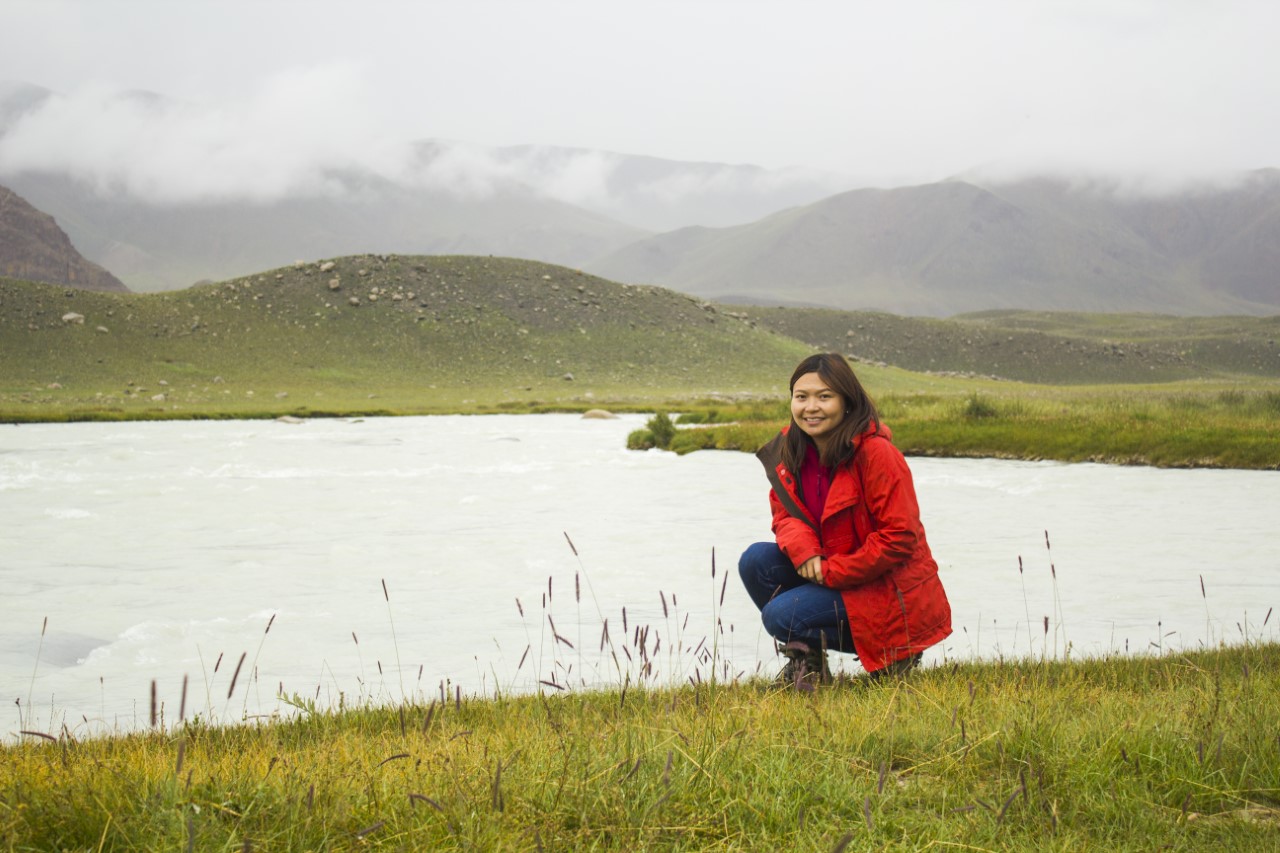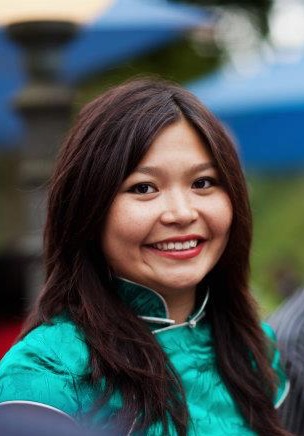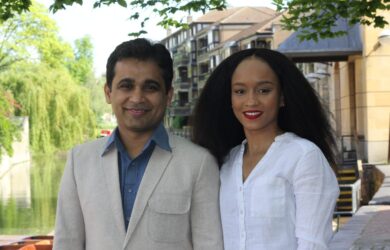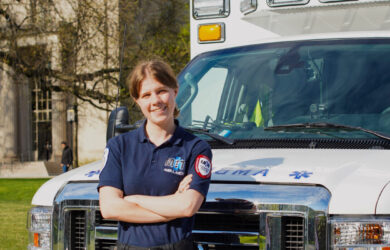
Onon Bayasgalan talks about her work managing a conservation project in Mongolia and how she hopes her MPhil will give her the business skills she needs to drive forward her interest in sustainability.
It was an eclectic group of partners: herder cooperatives, a mining company, conservation NGOs, a fashion company, NASA and an academic institution. If that kind of diversity of partnerships can work, I think anything can work.
Onon Bayasgalan
Onon Bayasgalan’s life has come full circle. As a child she went to primary school in Cambridge and now she is back to do her MPhil in Conservation Leadership.
“It feels like I am closing a loop, going back to Cambridge and also because my father did his PhD there. It is very poetic,” she says.
Onon, the first Gates Cambridge Scholar from Mongolia, has already got practical experience of leading a conservation project. In Mongolia she was manager of the Sustainable Cashmere Project [now known as the South Gobi Cashmere Project] for four years while at the Wildlife Conservation Society, working with a varied group of partners.
One was Kering, a major fashion group that includes brands like Gucci and Stella McCartney, which was willing to pay a higher price for sustainably sourced material. Another partner was Rio Tinto which had a copper and gold mine in Mongolia and is a major driver of the Mongolian economy. The cashmere project became Rio Tinto’s environmental offset project as it was based close to the mine.
A third partner was the Natural Capital Project based at Stanford University whose scientists collaborated with the project on research work.
Most importantly, the project works with local herders in the Gobi desert who produce cashmere from their goats.
The project is based on three key components – herders’ livelihoods, wildlife conservation (i.e. monitoring illegal hunting through camera traps and citizen science) and pasture lands health, which involves ensuring that grasslands are managed sustainably. Onon [2019] worked with nomadic herders to create a sustainable pasture management system that could eventually be incorporated into a certification scheme that is embedded in the cashmere supply chain.
Satellite images gathered and analysed by the Natural Capital Project through a NASA grant are being used to monitor pasture quality and provide a model that would be able to forecast pasture health based on different management schemes, amongst other variables.
Balancing all the various sensitivities of the project’s local, national and international partners as it grew demanded business skill, something Onon hopes to develop at Cambridge.
She says: “It was an eclectic group of partners: herder cooperatives, a mining company, conservation NGOs, a fashion company, NASA and an academic institution. Very diverse. If that kind of diversity of partnerships can work, I think anything can work.”
Childhood
Onon’s childhood gave her an international perspective from an early age. Born in Ulaanbaatar in Mongolia, her family moved to the Netherlands when Onon was six after both her parents were accepted to do master’s courses in geology. At the time, just after the Mongolian democratic revolution in 1990, not many Mongolians had had the opportunity to travel abroad, particularly outside the former USSR.
Onon’s family lived in Enschede in the eastern Netherlands. When she returned to Mongolia a year later she was only in school for two days before the family moved again, this time to Cambridge. Onon’s father had been invited to do a PhD in plate tectonics studying a fault in Mongolia.
Onon attended Morley Memorial School. She loved reading and writing and describes herself as a bookworm. Indeed she won first prize in a writing competition for primary schools in the area. Onon says she has great affection for her time in Cambridge and always attributes her later academic success to her primary school which, she says, taught her to follow her curiosity and gave her a love of learning.
She returned to Mongolia at the age of 11, having completed primary school and says she would read Harry Potter books over and over again to maintain a link with England.
As she had never learned to read Mongolian, she found it a challenge to catch up with her fellow students, but overcame this due to an innate competitive spirit and a deep drive not to fall behind her peers.
Onon went to an English-speaking high school where she was taught in English and Mongolian. For her final two years of high school she won a scholarship to attend an international school in Ulaanbaatar where she studied for the International Baccalaureate.
Environmentalism
When she was 13, a professor there had recommended that Onon consider going to college and suggested Whitman College in the US. His advice stuck in her mind and she applied, winning a scholarship in the process. She chose to do a combined major in environmental economics. She says her geologist parents inspired her interest in the environment. They used to take Onon and her brother camping in the countryside during the summer months. “There is a lot to see in Mongolia as it is so vast and empty. There are no fences anywhere. You can just camp wherever you want,” says Onon. At school her father asked her to do a translation about desertification, which increased her interest in the environment.
Onon was at Whitman College from 2005 until 2009 and did her undergraduate thesis on the desertification of Mongolia’s pasture lands and how the degradation of the land could be managed better.
During one summer vacation Onon interned for Oyun Sanjaasuren, a pro-democracy politician. Sanjaasuren hired Onon as her assistant when she finished college. It was an opportunity to learn about politics up close. Soon after she started working for Sanjaasuren’s foundation, the Zorig Foundation, named after her late brother. The Foundation, one of Mongolia’s leading NGOs, works on democracy, youth and community issues, particularly those related to the environment. There Onon helped to start up an environmental fellowship programme which promotes environmentalism and provides seed funding for various projects. Students – so far there have been 150 in total – go to a weekly lecture on the environment. Onon, who was the programme’s coordinator in its first year, also recalls taking fellows on a field trip to Eastern Mongolia in a Russian van.
After her experience at the Foundation, Onon started a master’s in Environmental Management at the Yale School of Forestry. The course was aimed at practitioners and included environmental policy and economics. Onon chose the course because she was keen to work for the Ministry of Environment in Mongolia later in her career.
Sustainable cashmere
Onon returned to Mongolia and soon started at the Wildlife Conservation Society, where she worked on and was eventually appointed the project manager of a new initiative, scoping out the feasibility of what was to become the Sustainable Cashmere Project.
One aspect of the project was to improve the quality of cashmere produced. Working with Kering, the project has made the process of goat-combing cleaner and more efficient. Local herders have also learned how to sort cashmere by quality, packing the different grades into cotton, rather than plastic bags. In addition, cashmere fibre quality has been improved through better goat husbandry and breeding processes. The project also supports veterinary services to improve the health and condition of goats. Through higher prices paid for cashmere and better access to markets for goat meat, cheese and milk, herders are able to have fewer goats and sell off older animals.
Onon stayed in post for over four years, growing the project, creating a momentum and working with partners to create a certification process for the production of sustainable cashmere.
She was keen to get more experience of conservation enterprise and build her business skills. “I had been learning on the job, but I felt I needed formal training. Business skills can be a weakness in conservationists,” says Onon. The project was also getting much bigger and more political and she felt burnt out dealing with all the different moving parts. She wanted some time and space to reflect so she applied to the University of Cambridge to do an MPhil in Conservation Leadership. It was the only programme she applied to.
She is keen to focus on how to put local communities at the centre of conservation projects and to learn more about how other countries manage things. “I have only seen the Mongolian management style so I am keen to learn more,” she says.
Eventually she wants to return to Mongolia and perhaps to set up her own initiative. “There is a lot to do in Mongolia. I want to have a positive impact,” she says.

Onon Bayasgalan
- Alumni
- Mongolia
- 2019 MPhil Conservation Leadership
- Newnham College
I was born in Mongolia, a country that is the most sparsely populated and has the coldest capital in the world. I studied Environmental Economics and later Environmental Policy at Whitman College and Yale University, respectively. During my years of study, I was fascinated by how the valuation of environmental services can be used as a powerful tool to influence policies. More recently, I managed a market-based conservation project called the Sustainable Cashmere Project while at the Wildlife Conservation Society Mongolia program. As an MPhil in Conservation Leadership candidate, I am very interested in further exploring ways to incorporate sustainable practices and standards into supply chains. I believe that forging strong relations with committed industries is one of the key solutions to expanding the impact and influence of conservation principles around the world. I am also passionate about further supporting young environmentalists, which will build on the Environmental Fellowship Program that I initiated while working for the Zorig Foundation. I hope to see Mongolian conservationists play a more critical leadership role nationally by pushing to incorporate climate change sensitive policies, and globally by increasing our collaboration with other countries. As a Gates Cambridge Scholar, I am very excited to be a part of a dynamic network of bright minds around the world that can cross-fertilize a rich array of ideas and experiences on innovative and pressing topics.
Previous Education
Yale University Environmental Policy 2013
Whitman College Environmental Economics 2009












